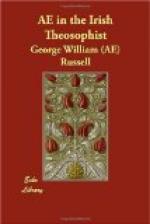“Tell me, for I would know, why do you wait so long? I, here in my cave between the valley and the height blind the eyes of all who would pass. Those who by chance go forth to you come back to me again, and but one in ten thousand passes on. My delusions are sweeter to them than truth. I offer every soul its own shadow; I pay them their own price. I have grown rich, though the simple shepards of old gave me birth. Men have made me; the mortals have made me immortal. I rose up like a vapour from their first dreams, and every sigh since then and every laugh remains with me. I am made up of hopes and fears. The subtle princes lay out their plans of conquest in my cave, and there the hero dreams, and there the lovers of all time write in flame their history. I am wise, holding all experience, to tempt, to blind, to terrify. None shall pass by. Why, therefore, dost thou wait?”
The Wise One looked at her and she shrank back a little, and a little her silver and violet faded, but out of her cave her voice still sounded:
“The stars and the starry crown are not yours alone to offer, and every promise you make, I make also. I offer the good and the bad indifferently. The lover, the poet, the mystic, and all who would drink of the first Fountain, I delude with my mirage. I was the Beatrice who led Dante upward: the gloom was in me, and the glory was mine also, and he went not out of my cave. The stars and the shining of heaven were delusions of the infinite I wove about him. I captured his soul with the shadow of space; a nutshell would have contained the film. I smote on the dim heart-chords the manifold music of being. God is sweeter in the human than the human in God: therefore he rested in me.”
She paused a little, and then went on.
“There is that fantastic fellow who slipped by me—could your wisdom not keep him? He returned to me full of anguish, and I wound my arms round him like a fair melancholy, and now his sadness is as sweet to him as hope was before his fall. Listen to his song.” She paused again. A voice came up from the depths chanting a sad knowledge—
“What of all the will to do?
It
has vanished long ago,
For a dream shaft pierced it through
From
the unknown Archer’s bow.
What of all the soul to think?
Some
one offered it a cup
Filled with a diviner drink,
And
the flame has burned it up.
What of all the hope to climb?
Only
in the self we grope
To the misty end of time;
Truth
has put an end to hope.
What of all the heart to love?
Sadder
than for will or soul,
No light lured it on above;
Love
has found itself the whole.”
“Is it not pitiful? I pity only those who pity themselves. Yet he is mine more surely than ever. This is the end of human wisdom. How shall he now escape? What shall draw him up?”




